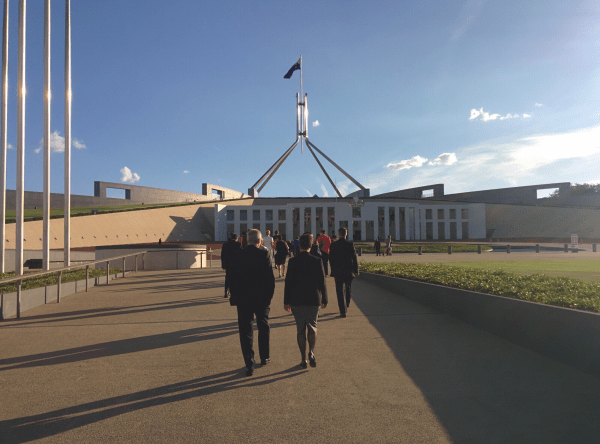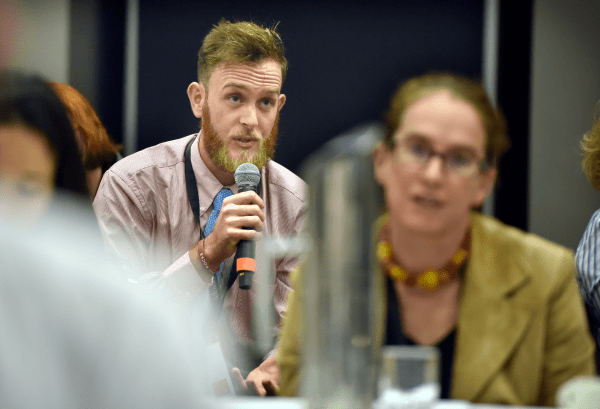This blog post is a repost from the Statistical Society of Australia Newsletter.

In February I was lucky to receive funding from SSA to attend the two-day event Science Meets Parliament, held in Canberra. Science Meets parliament brings together 200 scientists to learn about research communication, the role of research in policy, and how to engage a politician. We heard from speakers such as Professor Ian Chubb, Professor Brian Schmidt, Paul Bonjiorno, Alison Carabine, Professor Emily Banks, and Dr. Subho Banerjee, and Senator Kim Carr.
Day one consisted of panel discussions on how to use science to shape policy, the National Innovation and Science Agenda, and how to deliver your science in 60 seconds. A Gala dinner was held that evening and scientists got to share a meal with the attending politicians. Day two was the most valuable of the event, as we had the opportunity to have a face to face meeting with a politician. On day two, there were also panel discussions with politicians and scientists on how science and politicians mix in the real world. Participants also had the option to attend the National Press Club, and Question Time in the House of Representative or the Senate.
The event was opened by Nobel prize winner Professor Brian Schmidt in great style by taking a selfie of himself in front of the audience. I asked him what advice he would give to himself when he was in his PhD. He said:
Patience, and positivity: Patience, because good things don’t come all at once, and you need to wait for them sometimes. Positivity, because if you stay positive, it is the best possible outcome. Always.
Very wise words, from a very good source.
Another personal highlight was the session on ‘How to communicate science in 60 seconds’. Giving three steps for telling a story: “And”, “But”, “And therefore”.
A template might look like the following:
- Here’s all the things we know and that lead to this and this
- but we still need to know x, y, x.
- Therefore we need to do ABC
On the second day I met with the Member of Parliament for Griffith, Terri Butler. With me was Inge Koch from AMSI and Alfonso Garcia-Bennett from the Centre for Nanoscale BioPhotonics. This was my first time meeting a elected member of parliament face to face. I was struck by the breadth of Terri’s knowledge of issues relevant to the residence of Griffith, and was again reminded that whilst we often hear negative things about politicians in the media, they are intelligent, hard working people who care about their community. I’ve since emailed Terri a few times and have received replies shortly afterwards. I would highly recommend getting in touch with your local member.
I first got into research to help bridge the gap between policy and statistics, so that I could have some sort of meaningful positive impact on the world around me. My knowledge of statistics is constantly growing, but my knowledge of policy and politics is much more limited. Science Meets Parliament taught me how to engage politicians and policy makers, explained the role media plays in both science and politics, provided me with practical tools for evocatively delivering my research, and gave me the opportunity to engage in an excellent networking opportunity. I highly recommend attending Science Meets Parliament, it was an incredibly well run event, and I would absolutely attend again. Thank you to the SSA for providing me with this great opportunity!

There was a lot of fantastic advice given over the two days. I have condensed my thoughts and notes down into a short list below.
Nick’s Hot Tips On Politics, Science, Media, and Policy
On Politicians
- Never assume anything when talking to a politician.
- Know the issues that the politician thinks are important or challenging.
- A politician’s job is stressful, make meeting with them a positive experience.
- Politicians are employed to care for their electorate, so your research findings need to be related to their electorate to be relevant to them.
- Email your local member to stay in touch about issues important to you.
- Build the momentum when getting involved with politicians. Email straight after meeting, again later that week, and be sure to stay in touch.
- If you want to engage politicians and create change, respectfully engaging your local member is one of the best approaches.
- Reaching out to your local member doesn’t necessarily allign you with their political party; you are reaching out to someone who is employed to help those in their electorate.
On Communication and Media
- Science isn’t over until it’s communicated
- Tell a story with your research. You want people to walk away with one critical piece of information.
- Fight the temptation to say “I’m not an expert on that topic”. You might not be the leading expert in the world, but you are often the leading expert in the room. You can still give your professional opinion.
- As a scientist , don’t wait for media to engage with you. Actively engage and seek out media coverage
On Policy and Change
- If you want to be involved with policy, stay engaged with the policy process, and ask your local member how to get started doing this.
- Changes happen when politicians, departments, and advisors converge on a topic.
- Big change from science takes three to tango: Government, university, and business. They all need to work together and agree on an idea.
